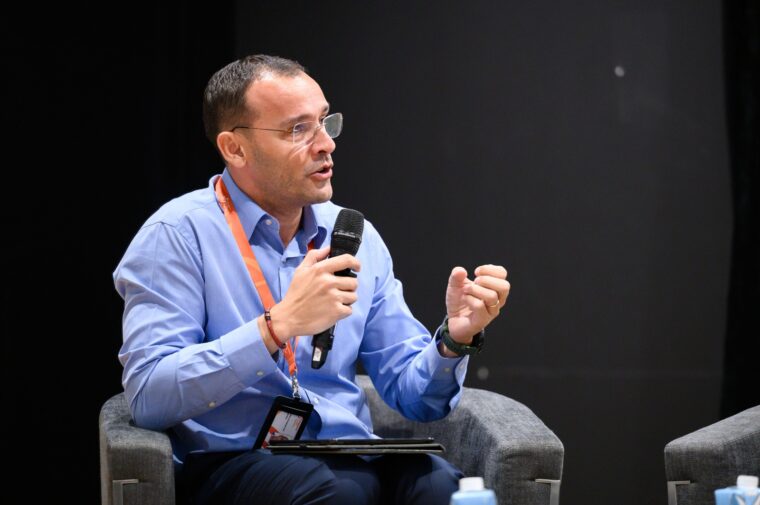Portuguese people who stand out abroad are helping to find out where business opportunities are and what kind of companies and activities the country can attract. An initiative that brings together Negócios and the Portuguese Diaspora Council.
1- What led you to leave Portugal?
I left Portugal for the first time in January 1999 for my first job, the 2nd edition of the Contacto Program, an AICEP initiative. Much encouraged by my parents, with whom I travelled a lot as a child and teenager, I was always curious to discover new cultures, to discover how people live and work on the other side of the world. One of the reasons for leaving Portugal was the possibility of creating a career, gaining more experience and more exposure, more quickly, than would be possible in Portugal. Unfortunately, our country is still unable to generate professional development opportunities for the many talents we produce.
Since that date, I have lived in Seoul, London, Luanda, and Johannesburg, in addition to Lisbon. Having lived in five countries and three continents gives us perspective, a more global notion of issues and a more tolerant and moderate approach.
2- What advantages or disadvantages did being Portuguese bring you?
I think the Portuguese have a good image: they are hardworking, humble, dedicated, and easy to integrate; They don’t shy away from challenges and are good team workers. The Portuguese people’s ability to adapt (and integrate) into any culture is known worldwide. We have intellectual flexibility and cultural agility well above average. We know how to respect other cultures and we are genuinely curious. I always end up discovering a Portuguese person in every country I visit – the last good surprise was in a restaurant in Kinshasa, DRC.
Generally speaking, my personal experience in all countries has always been positive. I have never encountered a situation in which my Portuguese nationality was an obstacle, quite the opposite. The perception of the Portuguese is also influenced by news about our country, whether on topics related to tourism, or of a political nature, about specific companies, or even about world-renowned Portuguese personalities, which we also have.
3- What obstacles did you have to overcome and how did you do it?
When living in such different countries, the barriers we typically encounter are: language, local culture, food, the integration of family life and social life, or even professional ethics and business culture. It is not easy to recreate our life (personal and professional) in another country, so family alignment must be the first obstacle to overcome, before leaving Portugal.
In the countries where I have lived, the main obstacles were: in South Korea, the language and food; in England, the gray and cold climate, and the high labour competitiveness; in South Africa, business culture and security; in Angola, informality, the fight against corruption and the sometimes tense relationship with Portugal.
To overcome these obstacles, it is necessary to have resilience and adaptability, empathy and understanding of the local culture and, above all, to be very humble. All countries, including Portugal, have positive points and less good points, but what counts is our attitude towards difficulties and adversities.
4- What do you admire most about the country you’re in?
Em Angola, admiro a felicidade genuína e autêntica, mesmo nas condições mais adversas. Apesar das limitações normais de um país que procura desenvolver-se e industrializar-se, a energia positiva e o elevado nível de empreendedorismo são surpreendentes e inspiradores. Um mercado com enorme potencial energético e agro-industrial e um país em acelerada afirmação internacional, incluindo no contexto africano. O crescimento da economia angolana tem sido pautado por volatilidade e incerteza, o que obriga os empresários e empresas a saberem lidar com imprevistos e a tornarem-se melhores gestores de risco.
5- What do you admire most about your company/organization?
The Standard Bank Group (“SB Group”) is the largest financial institution on the African continent. It is a leading institution in its sector, which maintains very high standards, frequently benchmarking itself against the best in the world. What I admire most about the SB Group is its aspirational purpose, very focused on the African continent: “Africa is our home, we promote its growth”. Standard Bank has the slogan “It’s Possible”, which I really identify with.
Another of the themes that I admire most about the SB Group is the determination to develop its people. It is a group that is concerned with being constantly at the forefront of topics relevant to the sector, such as talent management, technology, and innovation. The Group is also extremely concerned about protecting its reputation, always wanting to do the right business in the right way.
6- What recommendations would you give to Portugal and its entrepreneurs and managers?
I think there is a lack of courage to make important, long-term decisions, and then the discipline and focus on execution. It is urgent to increase productivity and also economic growth, allowing the generation of jobs and the creation of wealth, so that we can distribute it fairly, supporting those who need it most. Only then can there be more confidence in the future.
Portugal is an attractive country for foreign investment, but we urgently need to retain Portuguese talent, which continues to leave the country every year. It is critical to attract (much) more foreign direct investment focused on technology and industry. And it is essential to end the disease of corruption that erodes trust and undermines the future.
I would recommend that our businesspeople invest more in young talent, giving them the autonomy and challenges necessary so that they can reinvent their companies and help them find new opportunities for growth. In Portugal, young people are the future, we have to give them more conditions and tools so they can create wealth and help the country grow. I would recommend that our entrepreneurs form more partnerships with universities, to benefit from more innovation and research in their businesses. I would recommend that our entrepreneurs continually cultivate and educate themselves, so that they can understand today’s world and can rise to the new challenges we face.
We need a country looking at (and discussing) the future much more than irrelevant details of the present or a country stuck in unresolved issues from the past. The new generation is ambitious and has enormous skills and great potential. By giving it space, you will change Portugal for the better.
7- In which sectors of the country where you live can Portuguese companies find clients?
Portuguese companies will be able to focus on the areas of infrastructure and energy, construction and public works, large consumption, agro-industry, and the mining sector. These are very important areas that are receiving great focus and investment. These are fundamental sectors for the diversification of the Angolan economy.
It is essential to look at Angola as a strategic market with a long-term perspective. Do not give up or leave the market as soon as difficulties are encountered, which is normal in African markets, as the local way of thinking values the long-term investor. Angola needs to develop a business fabric with exporting DNA with connections (and knowledge) to very developed markets. Portuguese companies have this added value. Therefore, nothing pleases me more than when we support Portuguese companies to establish themselves in Angola (or any other country in Africa). It is worth mentioning the relevance of the African Continental Free Trade Agreement (“ACFTA”), which will encourage greater intra-African trade. Companies established in the market will have enormous possibilities to expand their business to other African countries. Already today, we have noticed this movement of companies based in Angola and expanding to the DRC, Ghana, Nigeria, Uganda, among others.
8- What is the competitive advantage of the country you are in that could be replicated in Portugal?
Angolan businesspeople will be interested in acquiring technology and knowledge that will allow them to become more competitive in Angola and in its regional expansion to the African continent. This is one of the motivations for investments in Portugal in the agri-food, energy, and industrial sectors, for example. On the other hand, Portugal is also a very attractive destination for diversifying investments into an international reference currency such as the Euro. In emerging markets, a capital allocation that allows exchange rate risk diversification is recommended given the volatility of these countries’ currencies, as is the case of Angola. For this reason, there may be investments in the financial sector, real estate, distribution, among others. Angola is a privileged partner for Portugal given our historical relationship and deep interconnection between people and our economies.
9- Do you consider going back to Portugal? Why?
Yes. Although there is no scheduled date, I would like to be able to support my country to grow and change mentalities, so that my children can have roots and be close to their family.
Read the original article here.







